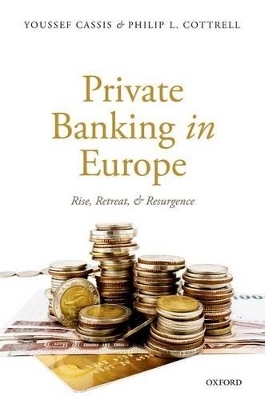
Private Banking in Europe
Oxford University Press (Verlag)
978-0-19-873575-5 (ISBN)
Private bankers have been defined as owner-managers of their bank, irrespective of their type of activity, which could be in any field of banking, sometimes in conjunction with another one, especially commerce in the earlier periods.
Analysing the experiences of European private bankers from the early modern period to the early twenty-first century, this book starts by examining the slow emergence of specialist private bankers, largely from amongst those who provided commercial credit. This initial consideration culminates in a focus upon the roles that they played, both during the onset of the continent's industrialization, and in orchestrating the finances of the emerging world economy. Its second theme is private banking's waning importance with the rise of joint-stock competitors, which became increasingly apparent in Britain during the mid-nineteenth century, and elsewhere within Europe some decades later. Lastly, attention is paid to the decline of private bankers in the twentieth century -a protracted and uneven decline, combined with the persistence and even the enduring success of some segments of the profession. It concludes with the revival of private banking in the late twentieth century as a response to the development of a new market - the management of personal wealth.
Youssef Cassis is Professor of Economic History at the European University Institute, Florence. He was previously Professor of Economic History at the University of Geneva (2004-2010) and at the University Pierre Mendes France, Grenoble (1997-04).He has held visiting professorships at the Cass Business School, the Graduate Institute in Geneva and the University of St Gallen. His work mainly focuses on banking and financial history, as well as business history more generally. His numerous publications on the subject include, A History of International Financial Centres, 1780-2005, (Cambridge University Press, 2006), and Crises and Opportunities, The Shaping of Modern Finance (Oxford University Press, 2011) among many others. He was the cofounder, in 1994, of Financial History Review (Cambridge University Press) and a member of the Academic Advisory Council of the European Association for Banking and Financial History and past President (2005-07) of the European Business History Association Philip L. Cottrell was Professor of Financial History at the University of Leicester when he retired in 2010. He was a leading member of the European Association for Banking History, and in 1994 with Prof. Youssef Cassis, a founding editor of Financial History Review, published by Cambridge University Press on the Association's behalf. Cottrell had an international reputation as a financial historian of the nineteenth and early twentieth centuries. His interests ranged widely, but he had particular expertise in English banking history in the nineteenth century and the financial reconstruction of Europe after the First World War. His main publications, notably Industrial Finance 1830-1914: The Finance and Organization of the English Manufacturing Industry (1980), remain standard works in their field. He died in 2013.
Introduction ; 1. . Instruments, institutions, centres and networks: developing the structural framework, c.1300-1700 ; 2. Public and private markets for capital and credit, 1688-1793 ; 3. War and economic transformation, 1793-185 ; 4. Golden age, 1815-1870 ; 5. The onset of the corporate economy, 1870-1914 ; 6. Indian summer, 1914-1931 ; 7. Decline and renaissance, 1931-c.2000 ; Conclusion
| Verlagsort | Oxford |
|---|---|
| Sprache | englisch |
| Maße | 173 x 240 mm |
| Gewicht | 636 g |
| Themenwelt | Geschichte ► Teilgebiete der Geschichte ► Wirtschaftsgeschichte |
| Wirtschaft ► Betriebswirtschaft / Management ► Finanzierung | |
| Betriebswirtschaft / Management ► Spezielle Betriebswirtschaftslehre ► Bankbetriebslehre | |
| ISBN-10 | 0-19-873575-8 / 0198735758 |
| ISBN-13 | 978-0-19-873575-5 / 9780198735755 |
| Zustand | Neuware |
| Haben Sie eine Frage zum Produkt? |
aus dem Bereich


